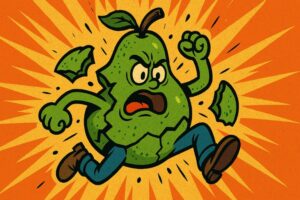Ever wondered why we compare unexpected disasters to a harmless fruit?
When a plan or situation unexpectedly fails or deteriorates.
When plans spiral out of control or situations take an unexpected turn for the worse, English speakers often reach for this quirky British expression.

“Go pear-shaped” doesn’t refer to a fruit-filled compliment but instead captures those moments when everything falls apart despite your best intentions.
This colorful idiom adds a touch of humor to describing life’s mishaps and has become a favorite way to lighten the mood when things don’t go as planned.
What Does This Idiom Mean?
“Go pear-shaped” is a popular British idiom that describes a situation going wrong, failing unexpectedly, or simply not unfolding as planned.
When everything appears fine and dandy at the start, only to collapse in a comical fashion later, you can say it all went pear-shaped.
For instance, imagine you have an important presentation at work. You practice your talk, your slides look great, and your boss gives you a thumbs-up before you begin.



When the projector breaks down mid-presentation, you’re left scrambling to explain your charts without visuals—classic pear-shaped moment!
That’s the perfect time to say, “Well, this has gone pear-shaped!” It’s a lighthearted way of indicating that things took an unexpected turn for the worse.
Origins of “Go Pear-Shaped”
Some language enthusiasts trace the idiom back to Royal Air Force (RAF) pilots, who reportedly used the term to describe a maneuver that went wrong and formed a shape resembling a pear.
The story goes that during certain training exercises, a pilot might start off flying in a neat, circular path. Then, if a mistake occurred, the flight path would widen at the bottom, looking a bit like a pear.
Whether or not this image is entirely factual, the vivid mental picture persists. This memorable shape offers an amusing way to highlight a plan or mission that strays far from its intended goal.
Funny Misunderstanding
Sometimes, idioms cause confusion when taken literally. A well-known anecdote involves someone who thought “go pear-shaped” was a flattering remark about a body shape.
He innocently told a dinner guest, “You’ve really gone pear-shaped,” intending it as a lighthearted compliment.
Naturally, the comment was not well-received, and laughter (plus a little embarrassment) ensued once the meaning was clarified.
Everyday Examples
1. “Our business proposal went pear-shaped after we lost funding.” When unexpected expenses or a budget shortfall occurs, the entire plan can fail to reach its targets.
2. “I tried to fix the leaking pipe, but it went pear-shaped and flooded the entire kitchen.” A simple do-it-yourself task can spiral into a disaster if something crucial goes awry.
3. “We planned a surprise party for a friend, but it went pear-shaped when he found out the night before.” Losing the element of surprise is a perfect illustration of things not going as intended.
4. “The event organizer forgot to confirm the venue, and everything went pear-shaped on the day.” One small oversight often snowballs into a major mishap.
These examples showcase how this idiom adds color to everyday language. Instead of simply saying, “It failed,” using “go pear-shaped” lightens the mood while conveying a sense of unexpected twists.
Visual Memory Hacks
Retaining new expressions can sometimes be tricky. One effective method involves linking an idiom to a vivid mental image or personal story.
When Things Go Pear-Shaped



Imagine baking a cake that sinks in the middle and bulges at the edges—it’s a perfect way to visualize ‘go pear-shaped’!
When you recall that disastrous baking moment, the phrase “go pear-shaped” instantly comes to mind. You’ll remember how quickly a situation can change from sweet to sour when something vital goes wrong.
Funny Stories for Easy Recall
Consider a real-life scenario where you try to decorate your living room. You carefully plan the furniture placement, only to realize at the end that your new sofa won’t fit through the door.
As it gets wedged awkwardly in the frame, you can’t help but exclaim, “This has gone completely pear-shaped!” That slightly absurd moment cements the idiom in your memory.
By associating “pear-shaped” with a quirky story, you trigger emotional recall. This technique helps you remember not just the idiom but also its practical usage in real-life mishaps.
Similar & Opposite
Idioms often come in clusters, and exploring related phrases broadens your language skills. Here are some expressions that mirror or contrast with “go pear-shaped.”
Similar Expressions:
- Go wrong: “My cooking went wrong when I mixed up salt and sugar.”
- Fall apart: “Everything fell apart after our main sponsor withdrew.”
- Go downhill: “The project went downhill once the key team member quit.”
- Fail miserably: “His attempt to fix the computer failed miserably, leaving the system in worse shape.”
- Hit a snag: “We hit a snag while renovating the bathroom and had to call an expert.”
Opposite Expression:
- Go smoothly: “Our travel plans went smoothly—we arrived on time without any delays.”
Using these phrases lets you paint a richer picture of success or failure. They come in handy whenever you need alternatives to “go pear-shaped” or want to express the complete opposite.
Additional Related Idioms
To further expand your repertoire, consider these fun idioms that also capture moments of chaos or excitement.
1. Go Bananas
When someone “goes bananas,” they lose control out of excitement or frustration. For example, “He went bananas when he discovered he had won the raffle.”


2. Go Nuts
This is similar to “go bananas.” If you suddenly burst into cheer or anger, people might say, “He’s gone nuts.”


3. Go Crazy
“Go crazy” indicates an extreme emotional reaction. A soccer fan might go crazy after their team scores the winning goal at the last second.
4. Go Bonkers
Acting irrationally or over-the-top fits the phrase “go bonkers.” Example: “They went bonkers trying to find the misplaced passport before their flight.”
5. Go Haywire
When machines or plans malfunction in a dramatic way, you can say they “go haywire.” Example: “Our computer network went haywire and crashed right before the deadline.”
All these idioms carry the idea of unexpected drama or disruption. Choosing one depends on whether you’re emphasizing emotional excitement, technical failure, or general chaos.
A Short Story
Imagine you’ve just received a long-awaited promotion. You’re typically calm and collected, but upon hearing the news, you jump around your living room like you’re on a trampoline.
In that jubilant moment, your family jokes that you’ve “gone bananas.” You knock over a lamp, sending your household into fits of laughter.
Although “go bananas” paints a picture of losing composure, it can highlight sheer joy as well. It contrasts with the more negative scenario of “go pear-shaped,” where things turn sour instead of sweet.
Pop Quiz: Check Your Idiom Skills
Go Pear-Shaped

Conclusion
“Go pear-shaped” is a playful British idiom used to describe when plans suddenly go wrong. It adds humor and clarity to everyday setbacks.



Try using it in conversation—it helps express real-life challenges and shows your growing comfort with English.
Even if your first try feels awkward, that’s okay! Language learning has its ups and downs—things might go pear-shaped, and that’s part of the fun.
Have a story where things went wrong? Share it in the comments and let’s laugh (and learn) together! 🍐💬









Comment